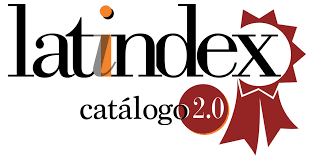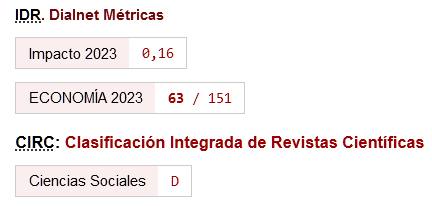Sobre el 'Nobel' de economía a Paul M. Romer
Palabras clave:
Nobel, Romer, crecimiento económicoResumen
La teoría del crecimiento “endógeno”, capitaneada por Paul M. Romer, reavivó el interés de la economía convencional por el efecto de las variables tecnológicas e institucionales en el desarrollo de largo plazo, al incorporar una explicación del incremento de la productividad y justificar la importancia del ahorro y la intervención pública como determinantes en la tasa de crecimiento. Sin embargo, los modelos “endógenos” han resultado difíciles de validar empíricamente y parecen particularmente expuestos a las críticas de exceso de formalismo y falta de claridad conceptual que el propio Romer ha dirigido recientemente contra el resto de la macroeconomía marginalista.
Descargas
Citas
Arrow, K.J. (1962) "The Economic Implications of Learning by Doing", *Review of Economic Studies*, 29(3), p.155-173.
https://doi.org/10.2307/2295952
Cohen, A.J.; Harcourt, G.C. (2003) "Whatever Happened to the Cambridge Capital Controversies?" *Journal of Economic Perspectives*, 17(1), p.199-214.
https://doi.org/10.1257/089533003321165010
Durlauf, S.; Johnson, P.; Temple, J. (2005) "Growth Econometrics" en: Aghion, P.; Durlauf, S. (eds.) *Handbook of Economic Growth*, North-Holland: Amsterdam, p. 555-677.
https://doi.org/10.1016/S1574-0684(05)01008-7
Fine, B. (2000) "Endogenous growth theory: a critical assessment" *Cambridge Journal of Economics*, 24, p.245-265.
https://doi.org/10.1093/cje/24.2.245
Krugman, P. (2013) "The New Growth Fizzle", *New York Times*, August 18th, [https://krugman.blogs.nytimes.com/2013/08/18/the-new-growth-fizzle/](https://krugman.blogs.nytimes.com/2013/08/18/the-new-growth-fizzle/)
Lucas, R.E., Jr. (2003) "Macroeconomic Priorities", *American Economic Review*, 93(1), March, p. 1-14.
https://doi.org/10.1257/000282803321455133
Lucas, R.E., Jr. (1988) "On the Mechanics of Economic Development", *Journal of Monetary Economics*, 22, July, p. 3-42.
https://doi.org/10.1016/0304-3932(88)90168-7
Romer, P. M. (1986) "Increasing Returns and Long-Run Growth", *Journal of Political Economy*, 94, October, p. 1002-1037.
https://doi.org/10.1086/261420
Romer, P.M. (1990) "Human Capital and Growth: Theory and evidence", *Carnegie-Rochester Conference Series on Public Policy*, 32, p. 251-286.
https://doi.org/10.1016/0167-2231(90)90028-J
Sala-i-Martin, X. (1997) "I Just Ran Two Million Regressions", *American Economic Review*, 87(2), May, p.178-193.
Romer, P.M. (1994) "The Origins of Endogenous Growth", *Journal of Economic Perspectives*, 8(1), p. 3-22.
https://doi.org/10.1257/jep.8.1.3
Romer, P. M. (2015) "Mathiness in the Theory of Economic Growth", *American Economic Review*, 105(5), p. 89-93.
https://doi.org/10.1257/aer.p20151066
Romer, P. M. (2016) "The Trouble With Macroeconomics", *The American Economist*, forthcoming.
Solow, R. (1987) "Growth Theory and After" Prize Lecture to the memory of Alfred Nobel, December 8th.
Steedman, I. (2001) "On 'Measuring' Knowledge in New (Endogenous) Growth Theory", Growth Theory Conference, Pisa (Italy), October 5-7th.
Temple, J. (1999). "The New Growth Evidence", *Journal of Economic Literature*, XXVII, March, p.112-156.
https://doi.org/10.1257/jel.37.1.112
Zumbrun, J.; Talley, I. (2018) "World Bank Unfairly Influenced Its Own Competitiveness Rankings", *Wall Street Journal*, 12 de enero, [https://www.wsj.com/articles/world-bank-unfairly-influenced-its-owncompetitiveness-rankings-1515797620](https://www.wsj.com/articles/world-bank-unfairly-influenced-its-owncompetitiveness-rankings-1515797620).
Descargas
Publicado
Cómo citar
Número
Sección
Licencia
Esta licencia permite a terceros compartir (copiar y redistribuir el material en cualquier medio o formato) y adaptar (remezclar, transformar y crear a partir del material para cualquier finalidad, incluso comercial), siempre que se reconozca la autoría y la primera publicación en esta revista (La Revista, DOI de la obra), se proporcione un enlace a la licencia y se indique si se han realizado cambios en la obra.







